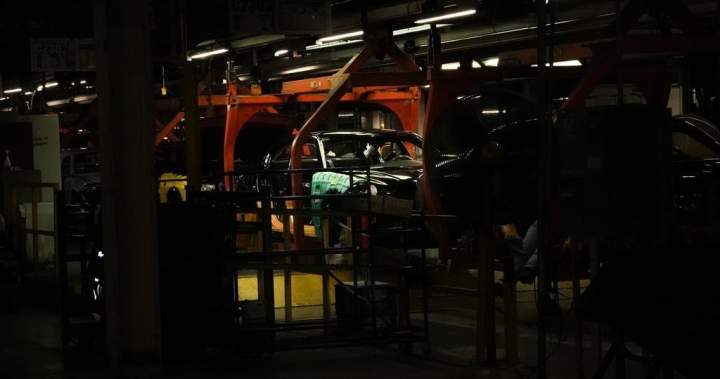Automaker Stellantis has cancelled its plan to make Jeeps at its Brampton, Ont., facility, shifting production to the United States in a major blow for the local and provincial economy.
Late on Tuesday evening, the union representing workers at Stellantis’ Brampton Assembly Plant said it had been informed the company was expanding its investment in the United States, seemingly at the expense of Canadian work.
“Canadian auto jobs are being sacrificed on the Trump altar,” said Unifor National President Lana Payne.
“Saving Brampton Assembly must now be this country’s top priority, sending a strong message to any corporation thinking they can take the same egregious actions.”
Stellantis had been in the middle of retooling its Brampton plant to assemble new vehicles earlier this year. It paused that work in the face of U.S. President Donald Trump’s auto tariffs.
Now, the Jeep Compass — which was slated to be made in Brampton — will be made in Belvidere, Ill.
The company stressed in a statement that it remained committed to Canadian jobs and hinted it could find a future for its Brampton operation.
“Canada is very important to us,” the company said. “We have plans for Brampton and will share them upon further discussions with the Canadian government. ”
Canadian politicians, however, reacted with fury, promising to push the automaker hard to stick by commitments to local jobs.
“I have spoken with Stellantis to stress my disappointment with today’s decision to prioritize investment into the U.S. and with Unifor to be clear that I will never stop fighting for Ontario’s world-class auto workers,” Ontario Premier Doug Ford said in a statement.

Get daily National news
Get the day’s top news, political, economic, and current affairs headlines, delivered to your inbox once a day.
The premier said Ontario had not yet contributed any money to Stellantis’ Brampton plant.
“Stellantis has a duty to live up to their promise to Brampton autoworkers and continue with their allocation in Brampton,” Ford said. “No provincial funding will be given until we receive clear assurances on when the plant will restart operations and meet that commitment.”
Prime Minister Mark Carney said the move was a direct consequence of U.S. tariffs and his government will be working with Stellantis to create new opportunities in and around Brampton.
“We expect Stellantis to fulfil the undertakings they have made to the workers of Brampton,” he said in a statement.
Ford’s government has invested heavily in automakers and electric vehicles in recent years.
During February’s provincial election, Ford committed to more than $14 billion in production subsidies for automakers, even as Trump signalled the state of play was changing.
Since then, several companies have pulled back. General Motors has dropped a shift at its production facility in Oshawa, and Honda has paused its plans.
During a call with Ford and other Canadian leaders, U.S. Commerce Secretary Howard Lutnik took an “aggressive” stance against Canada’s auto industry.
“I would say it’s a massive threat when you have the secretary of commerce coming out and saying that, and he would only say it if the president gave him the green light,” Ford told reporters on the sidelines of the summit last week.
“So right away you gotta put your guard up and be prepared.”
Fears about 3,000 jobs in Brampton
In Brampton, the immediate result of Stellantis’ shift to the United States is that thousands of jobs are suddenly at risk.
The plant, which has been down since early 2024 to prepare for the new production line, had about 3,000 employees before closing.
Vito Beato, president of Brampton’s Unifor Local 1285, said the change was “shocking” and would create deep uncertainty in the community.
“This came out of nowhere,” he told Global News. “What they said was it had to do with tariffs, it had to do with the tariffs and the economic feasibility of building cars here in Brampton.”
Beato said Stellantis had made commitments to his members and to different levels of government that it had to honour.
“We need the provincial and federal governments to step up because it has to do with tariffs,” he said. “There’s $13 billion in investment going to the U.S. and nothing here in Canada, so this definitely has to do with the tariffs. It’s a trade war.”
Stellantis’ $13 billion announcement involves producing vehicles in Illinois, Ohio, Michigan and Indiana, and reduces its focus on electrification.
— with files from The Canadian Press
© 2025 Global News, a division of Corus Entertainment Inc.




